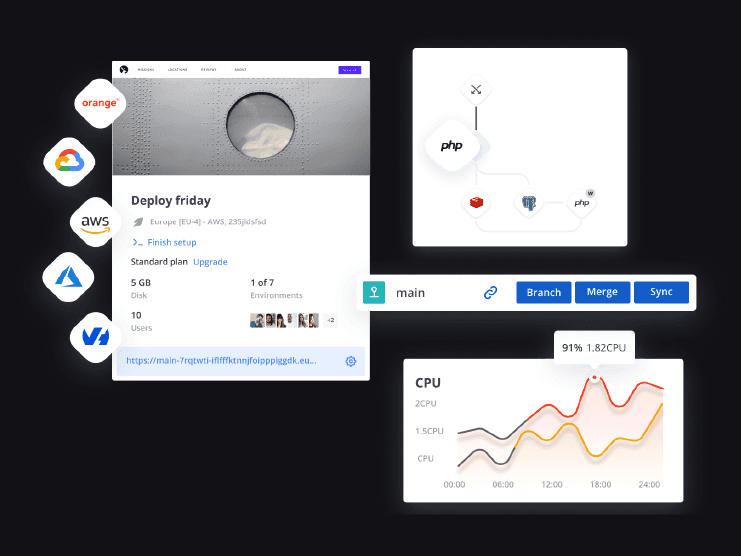
HMP Global’s PaaS journey: from weekly outages to 99.99% uptime
Global events and publishing company, HMP Global, strives to make the world a healthier place through the power of education within the healthcare industry. With brands including the HMP Global Learning Network, Consultant360, and Psych Congress on their roster of accredited medical education events which their team produces every single year.
We sat down with the Director of Web Development at HMP Global, Ryan Geraghty, to discuss how his team manages over 150 globally distributed microsites and applications for HMP Global events. Including an extensive lineup of virtual and hybrid events, many of which ran on Platform.sh. From implementing CI/CD and QA processes for their Drupal-centric application infrastructure. To local development to serve their events and audiences around the world and finding their groove when it comes to best practices for security and compliance.
Optimizing developer workflows for a 200% improvement on application stability
“We’re a global events and publishing company with journals and events within the healthcare space, and each of those properties has their own website,” explains Geraghty, “We probably have around 150 websites total.”
That’s 150 individual websites that require regular maintenance, optimization, updating, and security and compliance to run successfully. And with so many sites to manage, the HMP Global development team needed a tool that could facilitate flexible, local development to allow their developers to work seamlessly alongside each other. Not to mention reducing the time spent onboarding new developers, grappling with various PHP versions, managing dependencies, setting up local TLS certificates, debugging MySQL, and we all know the list goes on.
As partners of Lando, the leading open-source platform for managing local development environments, HMP Global was able to download their Platform.sh projects and run local environments with perfect replicas of their websites. Making changes in real-time and pushing code and config changes back to Platform.sh with just a few keystrokes with the help of our built-in CI/CD automation. While the developers can rest easy knowing that their local environment will be an exact match for production–no matter the website they’re working on.
The HMP Global development team was able to spin up multiple versions of the same site with different branches effortlessly. Geraghty shared that before using Platform.sh, DevOps was barely part of their workflow at HMP Global. And a large percentage of their applications weren’t tracked in Git at all which led to several problems when keeping track of changes. Now each change is spun up in its own testing branch and approved before being merged which has led to quality and stability improving by up 200%. While this additional process has added some time onto their deployments, they spend considerably less time dealing with outages and issues on the other side which makes up for it.
Not to mention, Lando even takes care of the complex networking between components–including databases, queues, and various runtimes–which means there was no need to set up and manage different versions of software on Mac or PC. With around 30 of HMP Global’s major platforms hosted on Platform.sh, they were able to optimize the developer workflow for around a fifth of their total website portfolio.
Reliable QA testing driving better results and increased uptime
With the local development capabilities that Platform.sh provides, HMP Global was also able to establish strong quality assurance (QA) and user acceptance testing (UAT) procedures which ultimately helped them deliver better-performing websites. As they were able to build new branches and accurately test them out before going to production.
A feature that Geraghty shares has helped his team deliver better quality websites, “because we can now have those actual QA and test links that can go out with better uptime,” with their Global Learning Network reporting uptime improving from 99.95% to 99.99% with Platform.sh. Geraghty said, “While not a huge difference, it’s our flagship and our most visible web property taking millions of visits a month, so the extra hours of uptime are a huge win for us—especially since we don’t have to worry about monitoring and fixing it ourselves.” And with their other websites averaging 100 visits per month—with that figure increasing significantly to anywhere between 1,000 to 100,000 visits leading up to an event—performance quality and reliability are central to their development team output. Now all downtime for HMP Global websites hosted on Platform.sh is a result of planned deployments—no more surprises.
Geraghty detailed a peculiar recurring issue that HMP Global was having with the stability of one of their sites which would crash at least once a week for various reasons. An issue which they still don’t understand the root cause of to this day. However, ever since moving the website over to Platform.sh it hasn’t had a single issue.
Stability, quality, reliability
“It’s really just the efficiency and being able to have better quality stuff and more stable stuff,” says Geraghty when summarizing the positive impact Platform.sh has had on his team’s output since joining us in February 2022.
With over 30 HMP Global websites now using our PaaS, the team has had plenty of opportunity to dive into all of the available features and capabilities. Of which Geraghty detailed automatic deploys and software updates, less time spent on DevOps, quality assurance, the ease of spinning up new branches in minimal time, and our security and compliance measures as real standouts. Especially as he shared, “We were really trying to keep the pricing about the same with what we paid previously, but add in these efficiencies in the process,” which they found with us.
 Switching to Platform.sh can help IT/DevOps organizations drive 219% ROI
Switching to Platform.sh can help IT/DevOps organizations drive 219% ROI Organizations, the ultimate way to manage your users and projects
Organizations, the ultimate way to manage your users and projects



